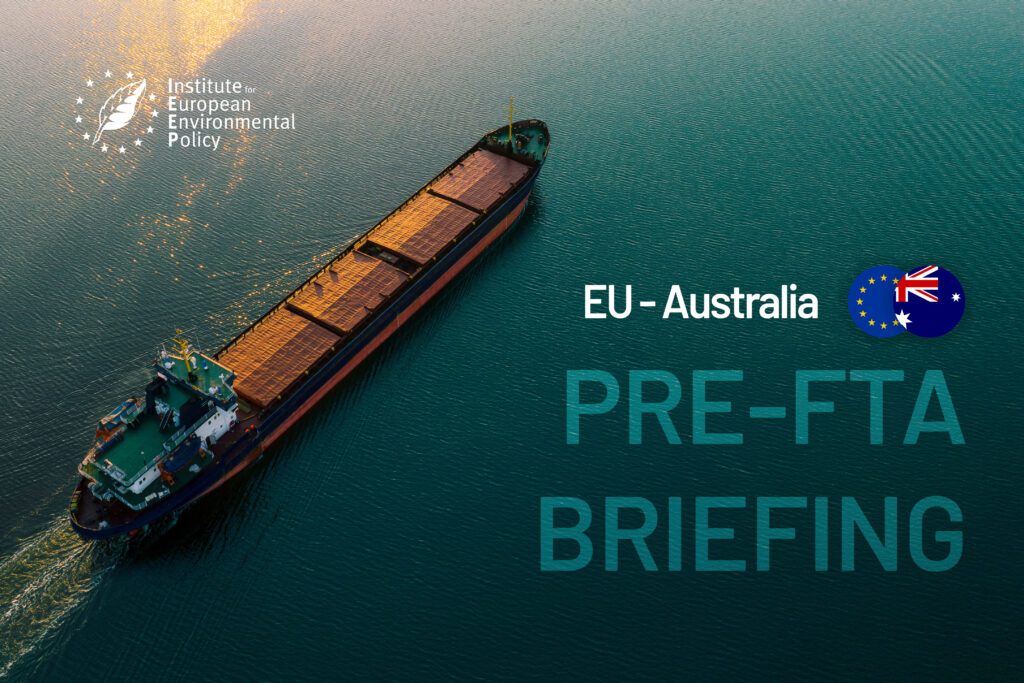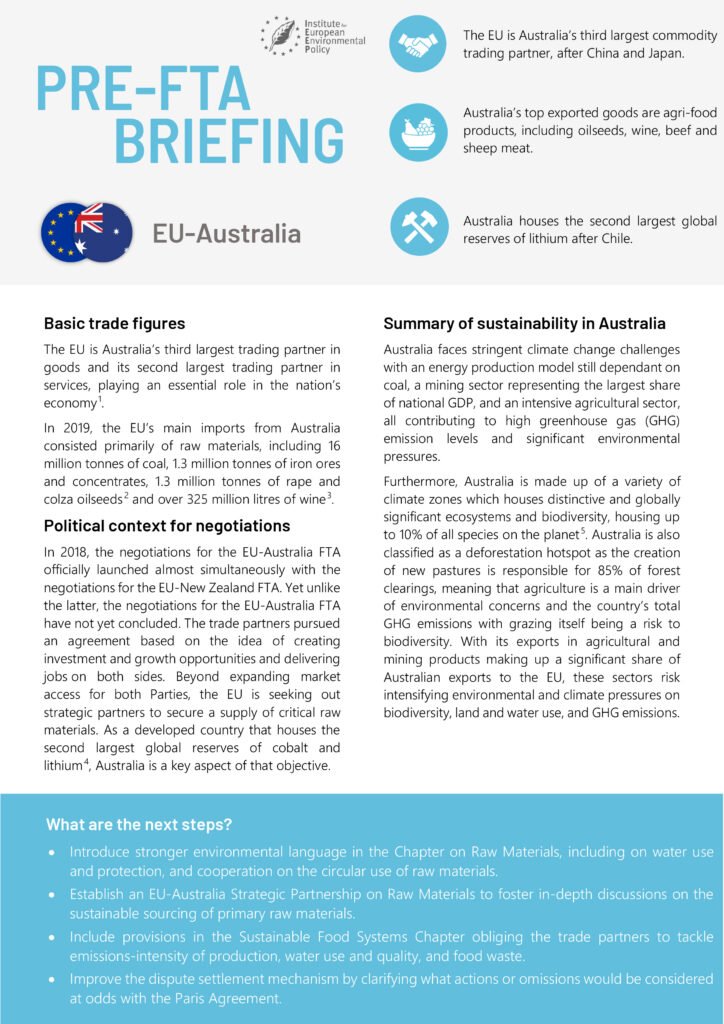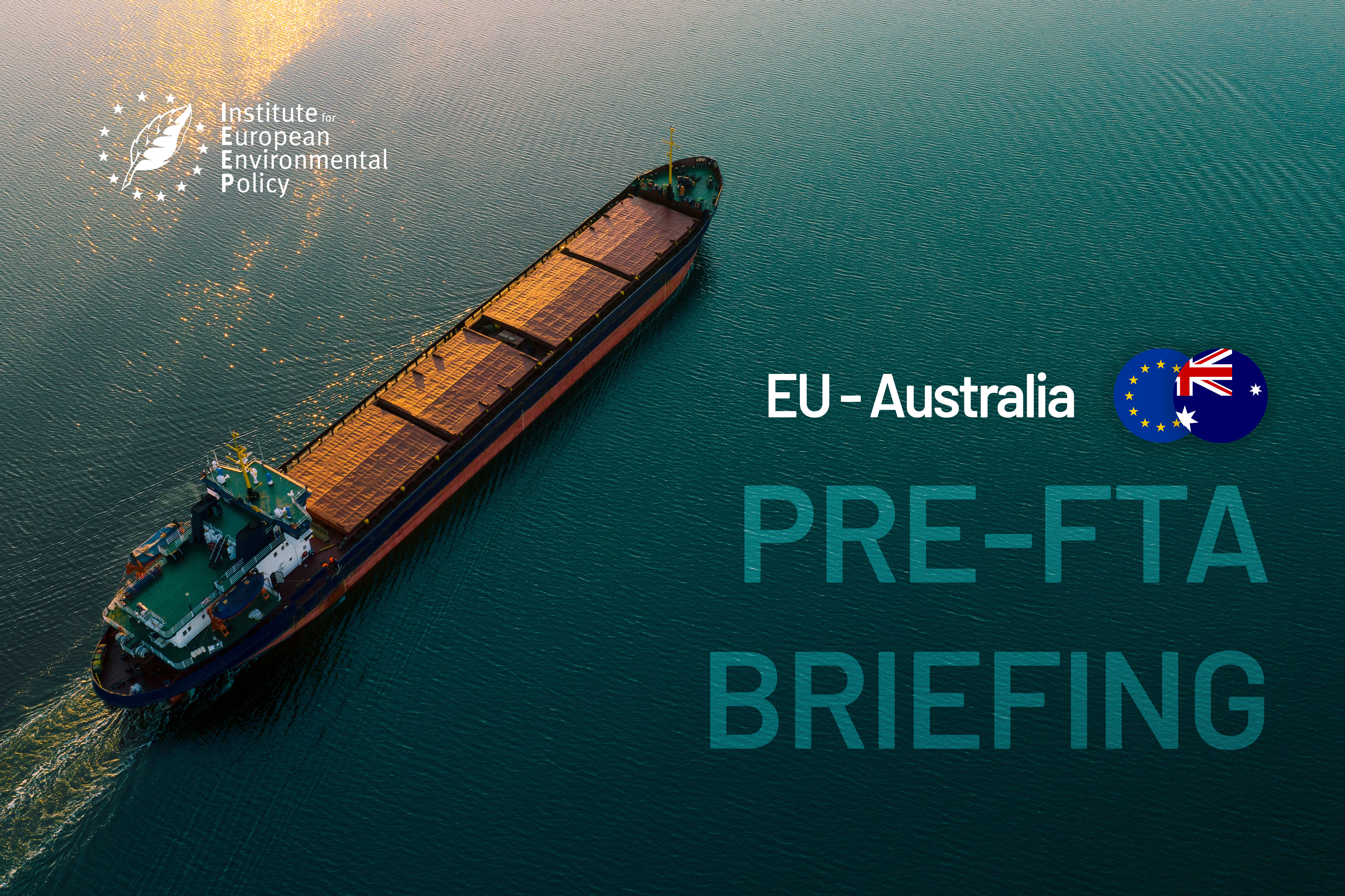AUTHORS: Nora Hiller, Eline Blot, Federico Sgarbi, Susanna Li
This briefing scopes out sustainability challenges relevant to the EU-Australia trade agreement and is part of an IEEP series aimed at monitoring upcoming free trade agreements (FTAs) that are being negotiated and concluded.

The EU and Australia plan to wrap up negotiations on the free trade agreement (FTA) launched in 2018 before the end of 2023. This briefing assesses sustainability challenges in Australia relevant to the FTA and proposes recommendations to further environmental and climate cooperation and progress between the trade partners.

This briefing is part of a new IEEP policy series monitoring upcoming free trade agreements that are either being negotiated or concluded. For more briefings assessing the environmental sustainability of future FTAs, consult this page.
Australia faces stringent climate change challenges with an energy production model still dependant on coal, a mining sector representing the largest share of national GDP, and an intensive agricultural sector, all contributing to high greenhouse gas (GHG) emission levels and significant environmental pressures.
The three most imported goods from Australia to the EU include raw materials such as coal and iron ores, and agri-food products such as oilseeds, wine, beef, and sheep meat. In fact, Australia’s agricultural system is heavily export oriented, with 72% of the agricultural production being exported. Moreover, Australian production of agri-food products such as cattle and sheep meat are more emissions-intense than in the EU. If the trade agreement would encourage EU demand for Australian cattle and sheep meat compared to less emissions-intense production, the EU could risk increasing its emission through consumption of such products.
Regarding the production and export of raw materials, Australia is not the EU’s main supplier of certain critical raw materials such as lithium and cobalt. However, it does house the second largest global reserves of cobalt and lithium and high resource potential for platinum-group elements. In light of the European Critical Raw Materials Regulation (ECRMR), the EU is searching for Strategic Partnerships with like-minded and more reliable countries to secure a stable supply for critical raw materials required for the green and digital transitions. Therefore, it is likely that, with increased global demand for critical raw materials, Australia will mobilise untapped reserves.
Considering the environmental significance of these two sectors, the following recommendations serve as a starting point to embed relevant environmental considerations in the FTA text, which could also mobilise cooperative actions outside the FTA.
Recommendations
- Introduce stronger environmental language in the Chapter on Raw Materials, including on the sustainable use of water and the protection of water quality.
- Cooperate on the circular use of raw materials, including exchanges on circular economy policies and initiatives to promote the repair, reuse and recycling of products with embedded critical raw materials. Special attention is due to the develop a common understanding on new standards for circularity and product design to facilitate repairs.
- Establish an EU-Australia Strategic Partnership on Raw Materials to foster in-depth discussions on the sustainable sourcing of primary raw materials.
- Integrate provisions in the Sustainable Food Systems Chapter which obliges the trade partners to pursue ambitious sustainable agricultural practices such as reducing emissions-intensity of products, improving local water use and quality, and tackling food waste.
- Improve the dispute settlement mechanism, building on the precedent set by the EU-New Zealand FTA, by on one hand, clarifying what actions or omissions would be considered at odds with the Paris Agreement, and who would decide on these potential infringements.
- Pursue cooperation at the International Maritime Organisation to minimise transport-related emissions, for example by including transport emissions into carbon pricing schemes. This can be included under the TSD Chapter’s Climate Change Article.
- Introduce a dedicated Chapter with binding commitments to assure the agreement protects the rights of Australia’s indigenous people and provides them appropriate support to also benefit from the FTA.


